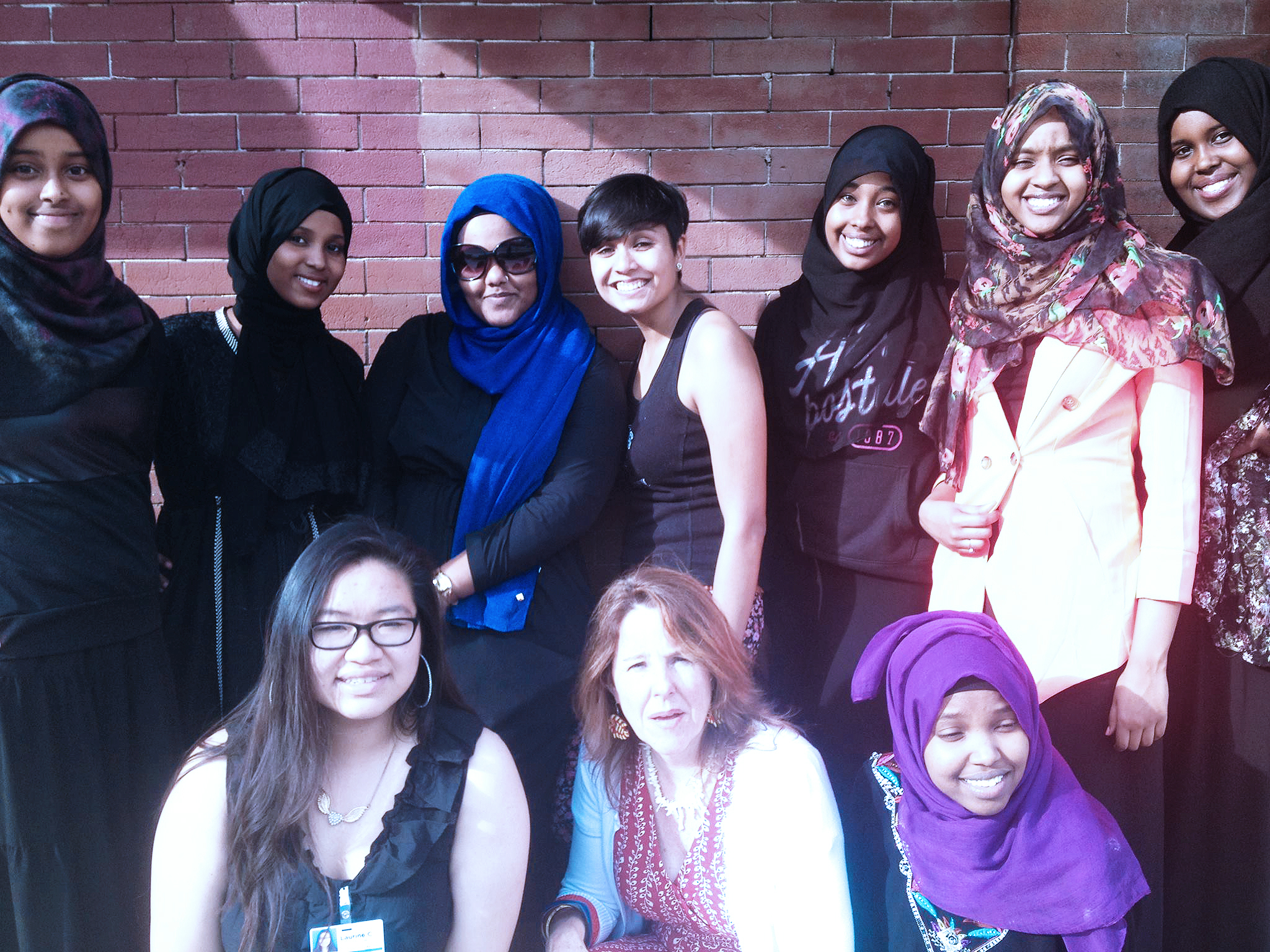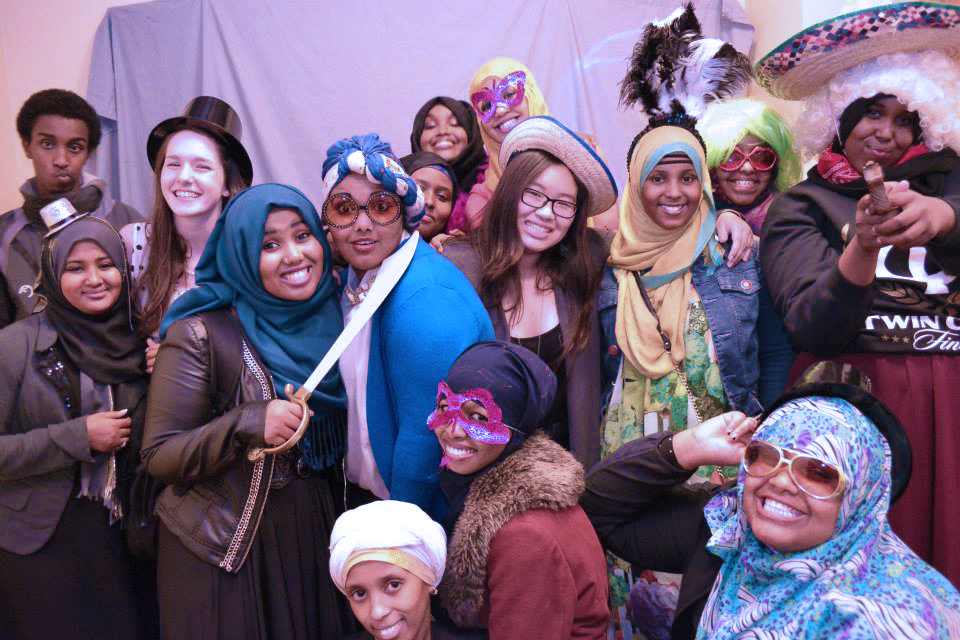At first glance, the new Sisterhood Boutique on Riverside Avenue next door to Augsburg College and the University of Minnesota‘s West Bank campus looks like many other spunky startups around town.
It’s packed with racks of blouses, jackets, dresses, slacks and shorts, displays of boots, shoes and jewelry, shelves of purses and bags, a vase of sunflowers and scarves hanging on the walls. The selection ranges in style from contemporary to retro to East African. This is clearly the work of women who have applied their talents to transform an empty storefront into a destination for shoppers looking for fashions at affordable prices.
All true. But there’s more to the Sisterhood story, which defies all the usual expectations. It was started by group of young Somali women who noticed how much fun their brothers and male classmates had running a coffee shop at the Brian Coyle Community Center in the Cedar Riverside neighborhood.
“We felt like there were not a lot of activities for girls in the community,” remembers Khadra Fiqi, an assistant at the store who was a Minneapolis South High School student at the time. “So we had a meeting of girls to talk about what we wanted to do. There’s a strength in girls and we wanted to do something for our community to create more opportunity.”
They agreed to start a women’s clothing store, and quickly came up with the name Sisterhood of the Traveling Scarf, based partly on the movie and novel “Sisterhood of the Traveling Pants.” And based partly on the fact that, as Fiqi says, “scarves are something that unite all women, and we are a sisterhood of women.”
“We went around to other stores to see what businesses are like,” recalls Fiqi, now a first-year student at Metro State University, “and we learned a lot about commitment — if you’re committed to something you can make it happen. Women with passion and power can help ourselves and help our community.”
From sorting to selling
Fiqi explains that she and her colleagues do everything it takes to run the business, “from sorting the clothes, tagging them, cleaning the store, being at the front as a cashier. I always thought of myself as a science person, not a business person. But now I am going to minor in business in college.”
The experience of opening the store helped Fiqi feel more at home in Minneapolis. “I was really surprised about all the support from people we don’t really know — people at Augsburg College and around the community.”
Stella Richardson, a management major at Augsburg, was one of those who pitched into help launch the boutique. While still in high school, she had started the Express Yourself Clothing store on Selby Avenue in St. Paul as part of an after-school youth program. “I told the girls about my experience and came to their meetings. As they were opening the store, I taught some business classes to them at the Brian Coyle Center.”
“They asked all the same questions I was asking when I started my store,” Richardson says. She notes that their boutique was even funded by one of the same organizations that financed her business, Sundance Family Foundation. Other funders of the Sisterhood Boutique were Augsburg College, Fairview Health Services, Women’s Foundation of Minnesota, the Marbrook Foundation and the Women Investing in the Next Generation (WINGs) Fund of the Greater Twin Cities United Way.
Augsburg students helped them devise a business plan, implement a marketing plan and design a logo, and offered informal advice on how to attract young customers studying and working on the nearby campuses of Augsburg, the U of M, St. Catherine University and the University of Minnesota Children’s Hospital.
“The store is changing the way the community perceives girls — in Somali culture girls are the most protected part of the community,” says Amano Dube, director of the Brian Coyle Community Center. “This project shows what they can do on their own.”
A breakthrough
Dube said that when a group of local leaders involved with the Faith in the City initiative toured the neighborhood — including Rulon Stacey, CEO of Fairview Health Services, which owns a brick storefront on Riverside Avenue that is adjacent to its University of Minnesota Children’s Hospital — “Augsburg President Paul Pribbenow brought them to the Brian Coyle Center and I took them into the leadership training class with the young people, who told them about the store.”
“Mary Laurel True [Augsburg’s director of community engagement] was leading the tour, and she suddenly announces that the girls would really like to have that building on Riverside Avenue,” remembers Pribbenow. Twenty-four hours later the president of Fairview called Pribbenow and said the boutique could have the building for free.
“We had the space available,” Stacey says, “and want to be a meaningful partner in the neighborhood. We’re really excited about it.”
Stacey was on hand at the boutique’s Grand Opening last summer, posing for a photo with the young proprietors in front of shop windows artfully displaying sundresses. Indeed, it was an all-out community event. Amano Dube, Mary Laurel True, Stella Richardson and a number of young shoppers were part of the celebration.
“I’m really excited about it,” said shopper Elena Eveslage. “It’s a good place to get good, cheap clothes, and a great opportunity for young women to learn business skills.”
20 trained so far
Fadumo Mohamed, a student at Minneapolis Southwest High School, was part of planning meetings and jumped at the chance to work at the store. “This is my first real job. It’s really good here, getting closer to people in the community, working with people my own age, learning about business. It will all be on my résumé.”
Store manager Laurine Chang, who is also a youth social entrepreneur coordinator forPillsbury United Communities, notes that 20 young women have been trained so far to work in the store. For three months they “learn about leadership, empowerment, personal and professional development, how to engage in the community, financial literacy, customer service, time management and business management.”
“The girls themselves felt there was a need for more opportunities for women in the neighborhood,” Chang says. “This project really is young people taking the initiative by responding to what the community needs.”
Source: Source: http://www.minnpost.com

